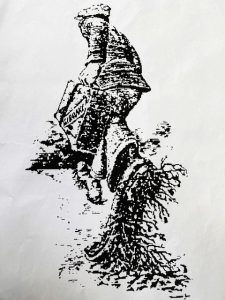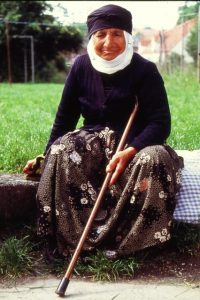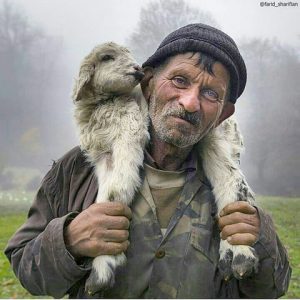Monday
Chi Alpha San Diego
Brandon & Kendra Kerston
“For six years you shall sow your field, and for six years you shall prune your vineyards and gather their crops, but during the seventh year the land shall have a sabbath rest, a sabbath to the LORD.” (Leviticus 25:3-4a)
During this time of unrest and uncertainty, we have been emphasizing to rest ourselves on what is certain in life. We have been focusing on the spiritual disciplines and teaching contemplative practices to our students to help us find rest and to learn to see the world and ourselves through God’s loving eyes. As with all spiritual practices, there are growing pains and distractions, highs and lows. But we have been learning together to move where life is taking us in a Christ-centered and Spirit-led way.
Scriptures that have been particularly formative during this season have been those that teach Sabbath principles. One such passage is in Leviticus 25:3-7, which talks about the Sabbath year—a year when you let the land rest and don’t work it for an entire year. Part of this passage says, “The land is to have a year of rest. Whatever the land yields during the Sabbath year will be food for you” (vv. 5b-6a). What a promise of God.
We have been believing, as a family and as a ministry, that as we do a different kind of work this year (forced upon us by online schooling) and as we teach students practices of rest and reliance upon God, He will continue to produce fruit, even more fruit than we produce in a “normal” year of laboring in ministry. The promise is even that the fruit will not just feed us, but everyone around us, including the foreigner, and we are believing for the pre-Christian (v. 6).
We are still doing everything we can to connect with new students and share the love of Jesus with them, but we are trusting more than ever in the Spirit, who really does the work anyway. This has given us a sense of freedom and of deeper trust in God that we really do believe has born more fruit in our lives, in the lives of our students, and in the relationships we have been building with other students and organizations on our campus.
One of the ways we have been practicing this “rest” that has produced greater fruit this year is by requiring less of our student leaders, but asking them to be ambassadors of Jesus in other student groups
on our campus. One of our student leaders is now the treasurer of a new student organization called Interfaith Oceans, and another is the secretary of SDSU’s International Student Organization. They are building key relationship that we know will bear fruit for God’s kingdom on our campus in the years to come.
Another principle that this demonstrates is the Missionary Principle: When people don’t come to you (because students don’t want another online meeting), you go to them, become a part of their world, and meet them where they are with the love of Christ.
Pray with us for these strategic partnerships and for our students to learn to trust God with all that they possibly can this year?
Tuesday
GTi HOPE
Byron Hack
“The Root of Jesse will spring up, One who will arise to rule over the nations; in Him the Gentiles will hope. May the God of hope fill you with all joy and peace as you trust in Him, so that you may overflow with hope by the power of the Holy Spirit.” (Romans 15:12-13)
For us, 2020 has been a year of trusting in God, at times being filled with joy and peace, and at other times overflowing with hope for His plans.
The year started with me walking away from a 31-year career in software development and management to join GTi HOPE full-time as president. That required a lot of trust! March opened with changing the name of our ministry, moving our website, rebranding, and developing new terminology—all to protect our ministry and our partner’s ministry from persecution and harassment by radicals.
Then came COVID-19 and the related changes to meeting online, not having our annual banquet, and struggling with lockdowns that prevented our partner from carrying out its day-to-day operations. Through it all there were reminders to trust in the God of hope. Isaiah 26:3 helped me remember that perfect peace comes through trusting completely in Him.
For nearly six months the ministry of our indigenous partner was on hold. We focused on helping our partner provide for its staff and provide relief kits of food and supplies to people starving in villages where literacy classes had previously been completed. August was consumed with desperate prayers for our indigenous partner. There was concern for the personal safety and health of the people and for the organization.
But grace, hope, and joy came shining through as the calendar turned to September. Our partner’s staff was able to return to working full-time. We learned that the literacy classes that started in September 2019 had continued in remote areas even while the country was under lockdown. Literacy programs that were delayed since March and August began training teachers in mid-September.
Today, we are overflowing with hope through the power of the Holy Spirit as we marvel at God’s protection and His provision! We have had a year of encouraging growth and an abundant harvest despite COVID-19 and the economic downturn!
Pray for the health and safety of our partner’s staff, especially the field workers, and for literacy teachers and students. Pray that people will have ears that hear and soft hearts as a fresh season of sowing begins.
Wednesday
For His Children
John Wiedmann
“Whoever welcomes one of these little children in My name welcomes Me.” (Mark 9:37)
For clarity, For His Children (FHC) is the US-based parent body. Hogar Para Sus Ninos (Home for His Children), or HPSN, is the orphanage in Ecuador. The orphanage is in Quito and Latacunga.
Annually the homes provide holistic care for 70+ vulnerable children, including shelter, food, clothing, safety, education, medical care, professional staff for physical therapy and psychological evaluation and therapy, and comprehensive reunification and/or adoption procedures. Providing these services costs about $1,000/month/child.
COVID-19 has caused HPSN to reimagine itself. Ecuador went on lockdown, including transportation. Tías (the “aunties” or the caregivers) normally traveled an hour or more by bus to the orphanages. They worked a day or night shift, then returned home for two days before repeating the cycle. COVID-19 forced change. Tías now live on-site for two weeks, working one 24-hour shift every other day. Also, there is now a quarantine room for new children arriving. God has blessed the orphanage with no COVID-19 infections.
The upside of COVID-19 is greater consistency, greater bonding, and less disruption for the children because the Tía turnover is less frequent. Also, full-time Ecuadorian staff members interact more with the Tías, learning more about their lives. Everyone is becoming more relationally connected, not just work connected. Spiritually, there is now a Tía-led Bible Study and a chaplain to build Christian spirituality (in a Catholic country), which improves their ability to speak to the children about Christ. Christ is “in the Tías” so that He may be “in the children.”
The downside of COVID-19 is new financial uncertainty. COVID-19 has decreased financial stability. Post-COVID-19, 70% of Ecuadorians are expected to be living on daily subsistence and in increased poverty. HPSN is now receiving requests to take care of new children, which may be due to an increase in poverty. The country’s depressed economy also means Ecuadorian financial support for HPSN will likely decrease. The goal of a 60/40 split in fund-raising between FHC and HPSN will also likely be more difficult to achieve. Currently, FHC has been able to increase its support for HPSN without tapping into its savings. A fund drive to raise $1 million achieved 85% of its goal.
Pray for increased Christian spirituality among the staff to avoid “mission drift” as the US staff hands the day-to-day operational duties over to Ecuadorians. Pray that HPSN and FHC can overcome ongoing financial challenges.
Thursday
International Fellowship of Evangelical Students/Turkey
“The believers who had been scattered preached the Word wherever they went.” (Acts 8: 4)
May the grace and peace of the Lord be with you. These days when we look at the problems in the world, we can find it difficult to understand the future. When I look at the current difficulties being faced in Turkey—such as COVID-19, government pressure on churches, negative and defaming propaganda about Christianity, different ideas of freedom brought by popular culture, and our inability to organize ministry activities due to universities not yet opening—I see there are indeed many different pressures and difficulties against the Word of the Lord here.
But in these past weeks, I have been encouraged a lot by this verse: “The believers who had been scattered preached the Word wherever they went” (Acts 8: 4). After the murder of Stephen, the Christians faced increasing pressure and persecution from people like Saul. The believers could have hidden and kept silent. But instead these believers who were scattered all over Judea and Samaria shared the Word of the Lord wherever they went.
Despite the fact that conditions were difficult, these early Christians found a solution, and that was to scatter seeds of truth. They did not run to help themselves, nor did they run to hide or start a different life. Wherever they were scattered, they continued to share what they believed; they proclaimed the glory and Good News of Christ, who had died and risen for them. The dispersed believers deeply understood the word of Christ which they shared. As a result, the number of believers increased daily.
I believe this word is very valuable to our lives today. Whatever the circumstances, in the face of much hardship we are “to scatter”; we need to take steps, not for ourselves but to bring glory to Christ.
Perhaps for us today “to scatter” could mean to bring forth different creative ideas and innovations for the spread of the Good News.
Even if everything seems hopeless, it is still important to hope in the Lord and to continue to serve Him for His glory. As it says in Obadiah 1:1: “The is what the Sovereign LORD says.” Today whatever troubles the universal church may experience, sovereignty belongs to our Lord. He has authority over all things. Just as Obadiah finished with these words, I also believe and am certain that “the kingdom will be the LORD’S.” (Obadiah 1:21). For this reason, we must continue to preach His Word courageously without fear or being daunted, knowing that all authority belongs to the Lord. The Lord will grow his family even more during these times of difficulty.
Pray for the “family dinner” gatherings that our missionary hosts with the believing students; there are seven this year. Pray that God will bless their time in the Word and that each of these young people will be growing in his/her faith. Pray for the animated short one-minute clips that our missionary and several people are working on to explain topics from a Biblical perspective to non-believers, such as love, the cross, grace, etc.
Friday
Project C.O.R.N. Bavaria
Bryant and Anne Wilhelmsen
Bavaria offers a strategic opportunity to touch many nations with the Gospel of Jesus Christ. Besides a large Turkish community, there are numerous buildings (refugee camps) where refugees are settled. Many of these refugees are requesting political asylum from the Federal Republic of Germany, but most will be rejected and returned home.
We must do our best to bless as many as possible, spending time with them and sharing Christ as He really is. These RIPE PEOPLES FOR THE GOSPEL are searching for new priorities for their lives. Today we consider Christian refugee outreach as high priority evangelism in Europe.
The following paints a picture that will make it easier to understand what we do as the Lord directs and orders our encounters with these RIPE PEOPLES FOR THE KINGDOM OF GOD. Thousands of refugees are streaming into Europe and landing often first in Greece. It’s the gateway to the European Union (EU).
These refugees have been uprooted from their nations and families, and one can see that their highest priority is to be replanted in fertile ground. Their roots are dry and their suitcases are marked “Germany” as a destination they hope and dream to reach.
Often these people are more than ready to give up everything just to be resettled some place where they are given refuge. As you can imagine, it does not take long for these people on the refugee highways to have their roots in life dried up. It seems God tends to uproot peoples and nations throughout history.
Sometimes this uprooting brings about new life to dry roots and bones. It is also God’s way of ushering in revival to people groups and to the nations. Migrations of peoples is certainly one of the tools God uses in bringing people closer to Himself. Bryant and Anne clearly see this as they mingle with the nations in these refugee camps.
At the moment we (the Wilhelmsens) are restricted to enter refugee camps due to the COVID-19 problems in their region of Bavaria. They have just received notice that there are more refugees being tested positive for COVID-19. Now there is a camp set up just for refugees found to be tested positive. A refugee camp is always a location where social distancing is almost impossible.
At the moment Bryant and Anne are having to find alternative ways of meeting with refugees safely. Bible Study has started once again, but picking up refugees with the mini-van is something that is complicated. Everyone coming to Bible Study is required to wear a mask.
The Refugee Rootman is just a reminder that the Wilhelmsens’ time is taken up fully with the work of replanting people back into a new life in Jesus.
Introducing their refugee friends to Jesus is only part of their work. They are often attending asylum court cases and helping refugees to cope with the courts. The German courts often have judges that do not know the Lord. They often belittle and do not believe the conversions of refugees from Islam to Christianity. Normally Bible Study can range from about 25 to 30 refugees. Many of them are from Afghanistan and Iran. Kurds are among them as well.
Pray for Bryant and Anne Wilhelmsen as they attend court cases. Pray for wisdom in finding new ways of spending time with refugees outside the camps. They are thinking of meeting in parks and doing bicycle trips along the river.
Pray for the ministry to refugee children since this usually took place in a refugee camp. This refugee camp is now a “no-go zone” for the children’s outreach on Fridays.
Pray that Bryant and Anne use their home wisely in this season of COVID-19. There are times when they still bring refugee friends to their house.
Pray for the Wilhelmsens as they continue to stay on track with keeping this vision alive and well. They so appreciate the Glenkirk Family through the years. Glenkirk’s faithfulness and support is what keeps them on the field these days. We can follow their efforts in part on Facebook. They use the name Bryant Doubleu on Facebook. Just send a friend request and tell them who you are.



It is encouraging that God is at work even though the times are difficult and restrictions hamper a bit of the freedom of movement within the camps. Above (far left) is a picture of the Rootman.


